Suffering from digestion problems and having poor digestive health is a terrible feeling that leaves you wanting to track down the cause and find ways to feel better fast. In this post we’ll share five natural ways to support your digestive system that you can put to work right away.
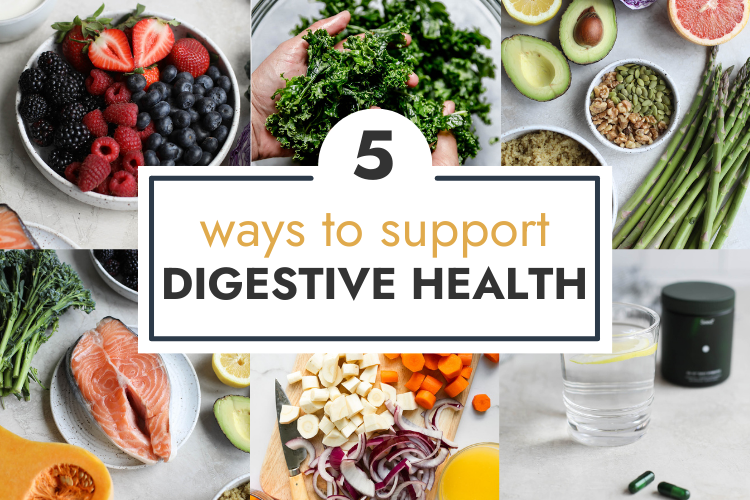
Want to save this page?
Enter your email below & we’ll send it straight to your inbox. Plus you’ll get great new recipes from us every week!
Supporting Digestive Health For Overall Wellness
Gas, bloating, heartburn, nausea, constipation, and diarrhea are all symptoms and outcomes of poor digestion. These are conditions that many people experience, either chronically or every once in a while. Unfortunately, for many people, suffering from digestive ailments has become part of their everyday routine, but digestive issues don’t have to affect your quality of life. One of the reasons it’s hard to find a solution is that people don’t like to talk about gut health and digestive health. It can be an embarrassing topic. That’s why we’ve shared some healthful tips you can use to support your digestion right here.
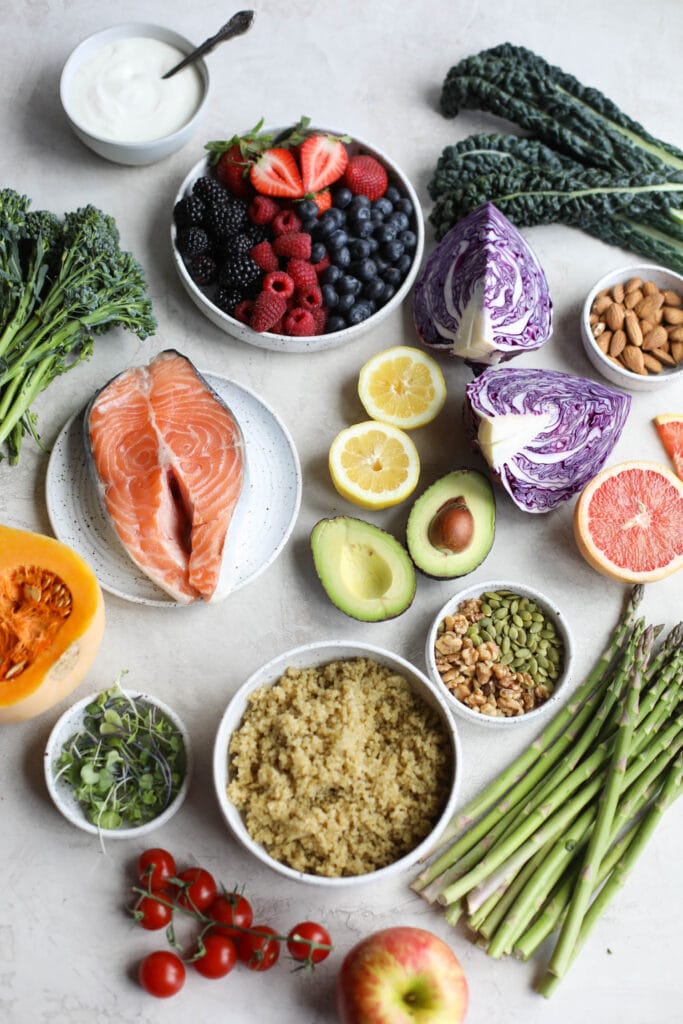
Common Digestive Health Issues
The most common problems associated with the gastrointestinal tract are diarrhea, constipation, irritable bowel syndrome (IBS), inflammatory bowel disease (IBD), GERD (gastroesophageal reflux disease), abdominal pain, painful bowel movements, and heartburn or acid reflux. These can be caused by several things, including an unhealthy lifestyle, poor nutrition, a food sensitivity, or even an infection. And just as there are many causes for poor digestion, there are many ways to help your digestive system work more smoothly.
5 Ways To Support Digestion Naturally
As a team of Registered Dietitians, we believe that eating real food, being active, staying hydrated, and practicing mindfulness are powerful tools that can help you feel better. And, with just a few adjustments to what, when, and how you eat, you can noticeably support a healthy digestive system.
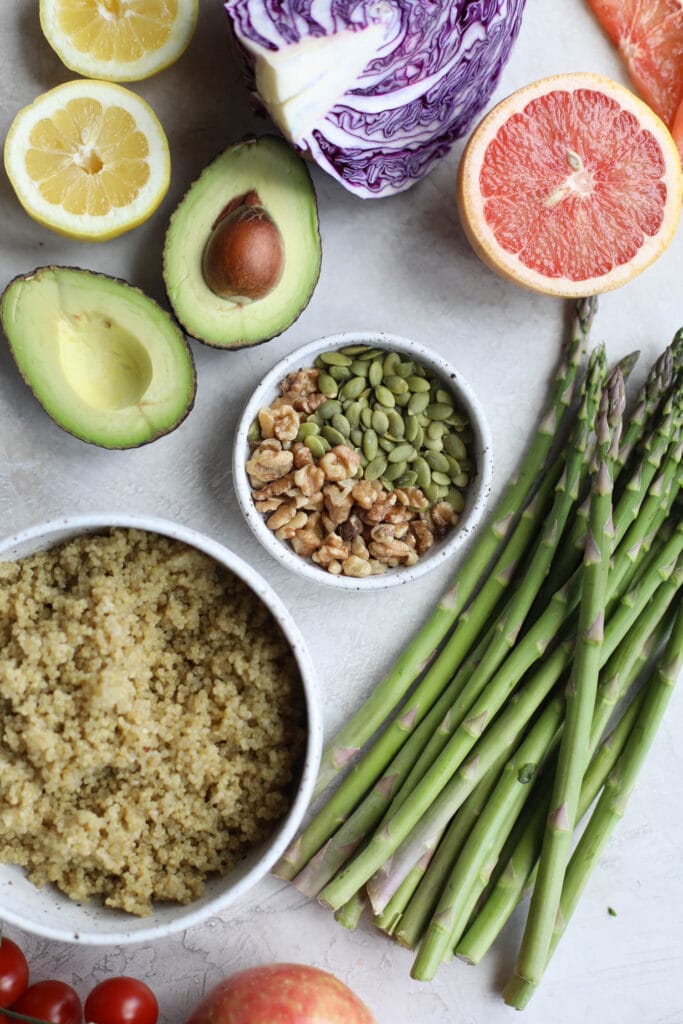
1. Adopt Mindful Eating Practices.
Believe it or not, a well functioning digestive system is a result of not just what you eat, but how you eat. Eating while you’re on the move or doing other things (standing up, having a stressful conversation, driving in your car, or during a lunch meeting, for example) creates an environment that is counterproductive to good digestion. Try this instead:
- A plate, a chair, a table. Make sure you have these three things when eating: a plate, a chair, and a table. Ensuring that your food is on a plate, and you’re sitting comfortably and upright in a chair at a table are simple actions with a big impact. Now, your only action left is to focus on eating. Just eating.
- Remove distractions. Turn off the television and move your phone away from the table. Focus on the foods you’re eating and the act of eating. Awaken all of your senses by noticing how your food tastes, smells, looks, and feels in your mouth. This is called mindful eating.
- Don’t eat angry. As hard as it can be sometimes, make a conscious effort to not eat when you are upset or in a bad mood. Your brain and your digestive tract are interconnected, so negative feelings at the same time that you’re trying to eat food can impact the effectiveness of your digestive system.
- Become a better chewer. Do this by chewing each mouthful of food thoroughly before swallowing it. Chewing your food into smaller particles is an essential, but often overlooked, step in the digestion process. Breaking down food in your mouth is actually considered to be the first phase of digestion, so it’s very important. As you chew food, saliva is released from glands in your mouth, which begins the chemical digestion of the food before it even reaches your stomach. Additionally, the presence of saliva triggers your stomach to produce acid and digestive enzymes in preparation for the arrival of your meal.
Use The Plate-Chair-Table Method
To be more mindful when eating, use the Plate-Chair-Table method, which means you’ll only eat when your food is on a plate and you’re sitting comfortably and upright in a chair at a table. This removes the less mindful eating episodes, such as when you’re grabbing food on the run or eating in the car or while lounging on a couch.
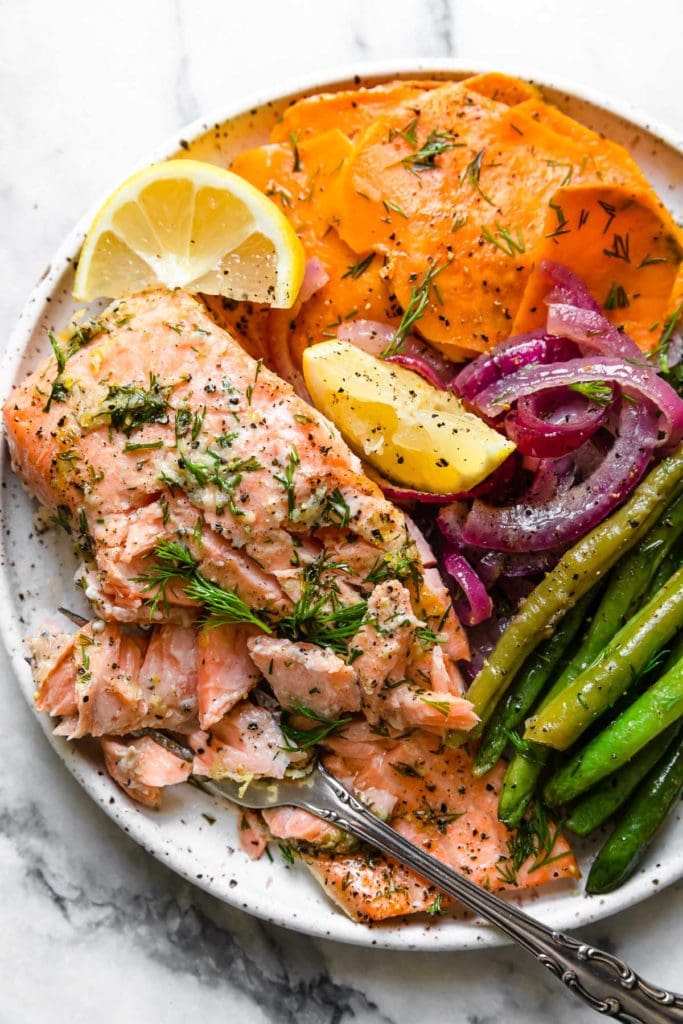
2. Eat More Real Foods.
When you focus on eating more real foods, you take the focus away from eating highly processed and high-sugar foods that are linked to increased inflammation in the body. Eliminating foods and toxins that have been linked to inflammation and replacing them with real, nourishing, and nutrient-dense foods is one of the best ways to help support digestion. Here’s what we suggest:
- Include more fermented foods in your diet. Foods such as sauerkraut, yogurt, kefir, kombucha, and fermented vegetables (just to name a few!) are delicious ways to add probiotics to your meals and snacks.
- Ditch artificial sweeteners in foods and beverages. Artificial sweeteners (the blue, pink, and yellow packets, specifically) have been linked to altered gut bacteria, which are needed for good digestion and overall health.
- Eat fewer highly processed foods. While many foods are “processed”, including wholesome foods like peanut butter or chopped and frozen vegetables, what we’re referring to here are highly processed foods. Those foods offer little to no nutrient value and are often full of refined sugars, artificial flavors, colors, and preservatives that put strain on your kidneys and liver, and have been shown to have addictive effects.
- Choose carbohydrates wisely. Some carb sources, including whole grains, starchy vegetables, and fruits come with other health benefits, so opt for those first when selecting your carbs to eat. Whereas other carb sources, like sugary foods, juices, sweet snacks, and candy don’t provide many health benefits and can be gut irritants.
- Consider cutting back on less healthful sources of gluten. Gluten in baked goods and processed snacks made with white flour doesn’t come with many other health benefits. Additionally, gluten is a common allergen and gut irritant for many people, even those without gluten allergies like celiac disease.
Try One Of Our Real-Food Meal Plans
Start your real-food journey today by following one of our free 2- or 4-week meal plans that come complete with grocery lists and tips to make healthful eating easier. Click here to view our Free Meal Plans.
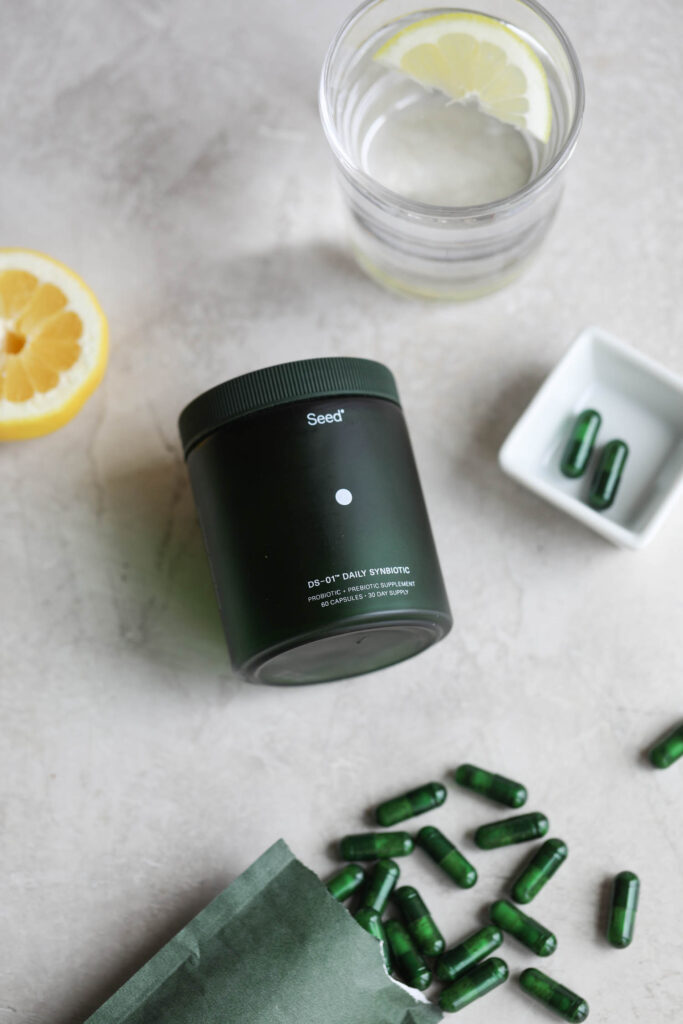
3. Start Taking Probiotics.
Probiotics help promote the good bacteria and microorganisms that live in your gut, which is known as your microbiome. The helpful “bugs” live in your intestinal tract where they produce vitamins and short-chain fatty acids that feed and nurture nonpathogenic (non-disease causing) bacteria that aid digestion. They help break down the foods you eat and have been linked to other helpful actions. Those include preventing infection, supporting your immune system, and reducing chronic inflammation.
You can get more probiotics by eating more fermented foods, such as kefir, yogurt, sauerkraut, kimchi, and kombucha. And you can get your best bang of probiotics by taking a probiotic supplement. These come in many forms, including high-quality synbiotics, which are probiotics and prebiotics together. Our favorite synbiotic is Seed DS-01® Daily Synbiotic, which is made of 24 scientifically-validated and clinically-backed probiotic strains with a patented, non-fermenting prebiotic. This formulation includes probiotic stabilization to deliver 100% of the strains to the lower small intestine and ultimately the colon, which can support systemic benefits, including digestive, heart, and skin health. As a friend of our, Seed would like to offer you 20% off your first month of Seed’s DS-01® Daily Synbiotic when you use code RFD at checkout.
What’s a synbiotic?
Quite simply, it is a prebiotic and a probiotic in one. Our favorite synbiotic is Seed DS-01® Daily Synbiotic.
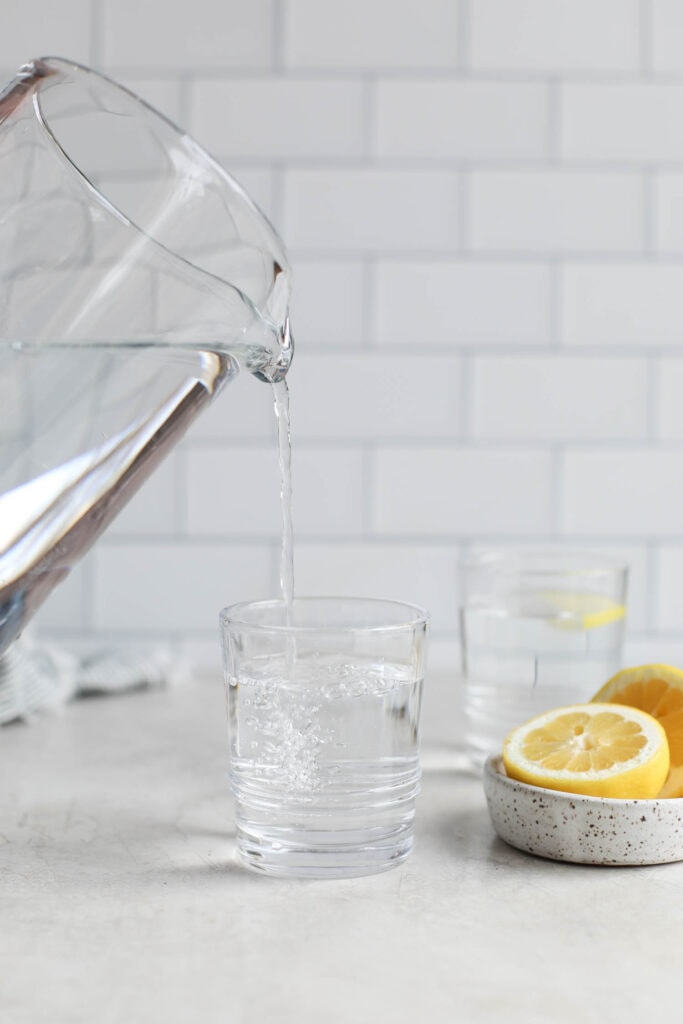
4. Focus On Hydration.
Water is an important element of digestive health. You need water to digest solid food and absorb nutrients properly. Without enough water your body can become dehydrated, which can lead to decreases in blood pressure and result in constipation. Follow these tips:
- Drink enough water each day. The average person should aim to consume approximately 80 ounces of water or other non-caffeinated fluids each day.
- Aim to drink water between meals. Try to drink more of your daily water between meals instead of with meals. Drinking too much water while you’re eating food can dilute your stomach acid, which is vital for optimal digestion. More on that next!
Water Helps Support Digestive Health
You need water to properly digest food. Without enough water your body can become dehydrated, which can lead to decreases in blood pressure and cause constipation.
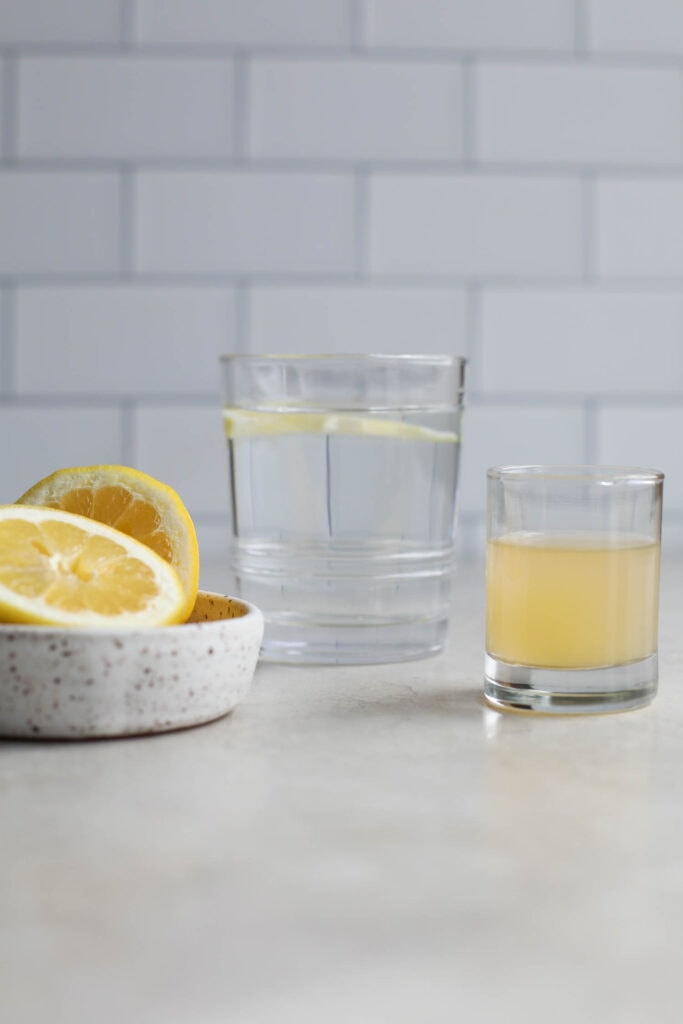
5. Boost Your Stomach Acid.
A high level of stomach acid (or hydrochloric acid) often is not the cause of heartburn, as was once the belief on this topic. Instead, it’s often too little stomach acid that’s to blame for certain digestive health issues. In order for food to be released from your stomach and further digested in your small intestine, food needs to be in a liquid state.
If you don’t chew each mouthful of food thoroughly and you don’t have enough stomach acid, your stomach needs to do more “mechanical” digestion (thinking churning, squeezing, and turning) to break down the food before it can pass it on to the small intestine where most of the digestion and absorption of the food’s nutrients takes place. The more mechanical digestion that your stomach is required to do, the longer food remains in your stomach. There, it starts to ferment and create pressure (gas and bloating, too). What you have then is a perfect storm for heartburn or acid reflux. That’s because the increased pressure on your esophageal sphincter (that’s the muscle that closes off your esophagus from your stomach) can cause the stomach acid to flow back up into your esophagus, which has a painful burning sensation. Here are some ways you can increase your stomach acid:
- Add lemon juice. Add fresh squeezed lemon juice to the water you drink between meals.
- Or apple cider vinegar. Try drinking 1-2 teaspoons of raw unfiltered apple cider vinegar mixed into a small amount of water before each meal.
- Chew your food better. Chew each mouthful of food until it is nearly impossible to discern what was in the bite you took. This may mean you aim for 15-20 chews per bite.
Become A Better Chewer
Chewing your food thoroughly is an important step of proper digestion. Aim to chew each bite 15 to 20 times before swallowing.
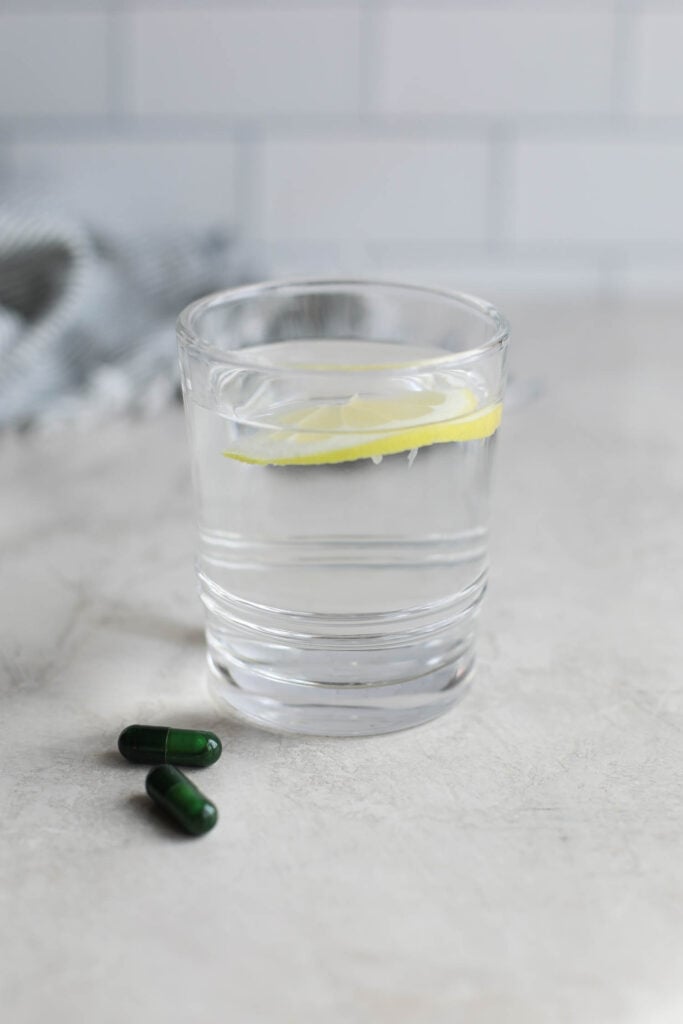
If Digestive Health Issues Continue
If your digestive health issues continue, we encourage you to talk about any digestive problems with your health practitioner. It’s a common issue, and your healthcare team has heard it all. Don’t be afraid to address digestion and any gastrointestinal issues with your health providers. Ongoing digestive disorders could be a sign of more serious conditions or digestive diseases. Those include Crohn’s disease, colon cancer, ulcers, liver disease, colorectal cancer, gallstones, or issues with your pancreas, small or large intestine, rectum, or gallbladder. They may refer you to a gastroenterology or hepatology department where specialists may recommend a colonoscopy, endoscopy, or cancer screening.
Remember that your digestive health is important to your overall wellness. And nearly everyone has experienced some type of digestive problem at one time or another. Some digestive issues are harder than others to troubleshoot and fix. But many of them can be supported with the five adjustments we shared above.
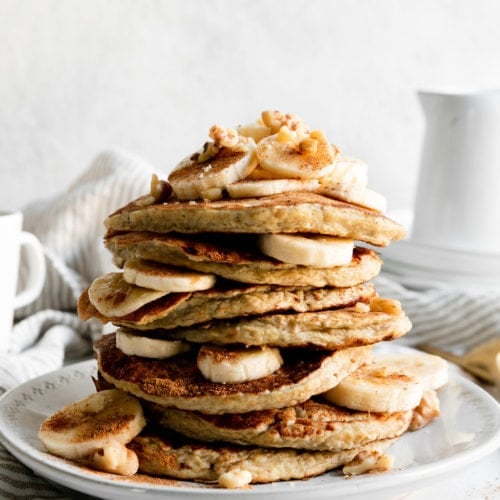

IM GOING TO START CHEWING MY FOOD MORE into little Pieces… Before I try to Digest my food
. I think This’ The problem why my good is Hard tp swallow or Digest
Same here I always in A rush to Eat & Go Barely ‘chewing my Food. Into Smaller piecies
I will try to drink water between my meal rather than with my meal.
Really helpful
This was very helpful, I’ll try to chew to liquid form I’m almost in a hurry to swallow
How do you recommend timing vitamins? My prenatals and supplements are supposed to be taken with meals. Is it OK to space them out to a half-hour after to delay drinking water after meals? Is one cup of water considered sufficient to dissolve a capsule, and can thus be used as a limit to prevent as much stomach acid dilution around meals as possible? … Thank you for any insights you can provide!
Hi Lindsay, if a supplement should be taken with a meal, it is usually fine to take them about 30 minutes after eating, as the point is that they should not be taken on an empty stomach to avoid feeling nauseous. So 30 minutes after a meal will be OK, and yes 1-2 cups of water at that timing would not be too much to dilute stomach acid.